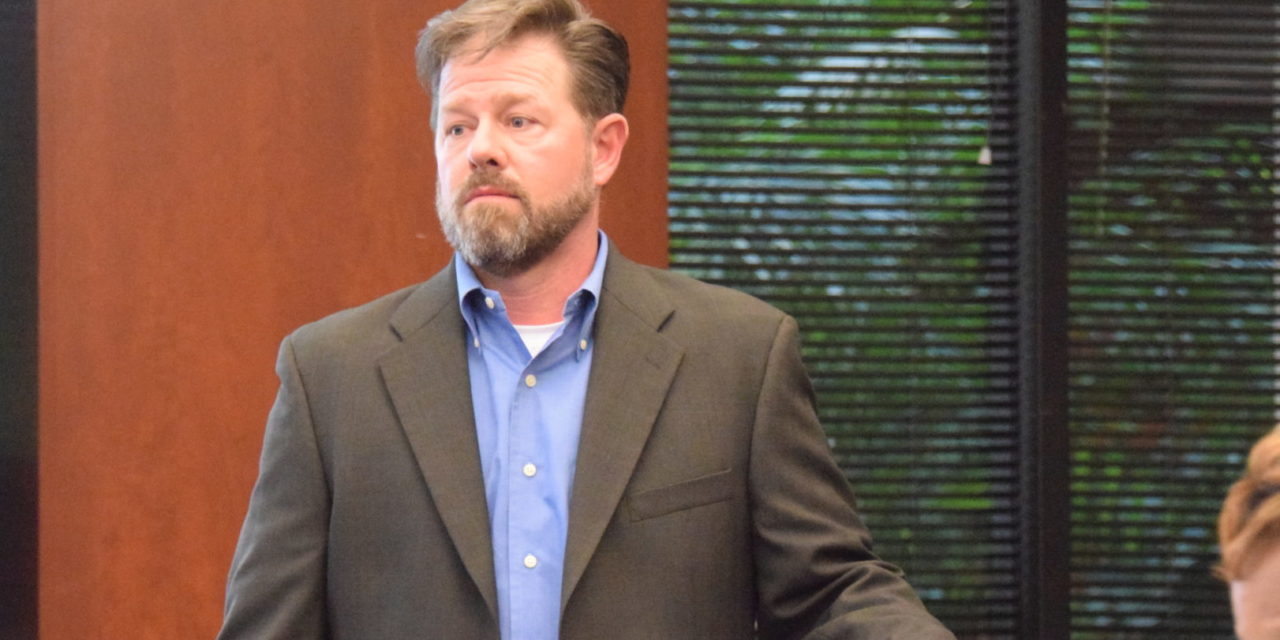On April 30, Greensboro Field Operations Department Director Dale Wyrick is retiring, and it is a more momentous occasion than it might seem.
Wyrick, although he won’t admit it, created the Field Operations Department and is the first and only director the department has ever had.
Wyrick said that using the word “created” gave him too much credit, which is pretty much what you’d expect from someone who generally operated behind the scenes, getting things done.
But Wyrick does admit that establishing a field operations department was his idea, that he put it together and then applied for the job as the director of the brand new Field Operations Department. It was probably only a surprise to Wyrick that he got the job.
Wyrick said that, as a division head in the Transportation Department, he had noted the difficulty in coordinating all the various departments that had to deal with weather emergencies and thought it would streamline the operation if as many as possible of the divisions responding were in the same department.
As a result, Wyrick said he is looking forward to the first snow of his retirement, since one of the many jobs of field operations is clearing the streets of ice and snow.
Most people come in contact with field operations because it is also in charge of trash, recycling, yard waste and bulk pick-up. Sometime around 2010, the Field Operations Department also took over operation of the White Street Landfill, where yard waste and construction debris go, and the transfer station where what most people call garbage, but what is officially municipal solid waste, goes.
It also puts Wyrick in charge of getting the garbage from the transfer station to the landfill, which means complicated hauling and landfill contracts have to be negotiated. At times these contracts have generated a lot of publicity but Wyrick recently negotiated the contract with the Randolph County Landfill for another three years without too much fanfare.
Field operations is also in charge of street and sidewalk repair, mowing the rights-of-way and parks, landscaping around city buildings, tree trimming and removal, stormwater runoff, street cleaning, litter, dead animal pick-up and, a topic that the City Council discusses every year in the fall, loose leaf collection.
Wyrick said, “I know the number one call field operations used to get is dead animal pick-up and it still might be.”
Some people, if they were putting together a department they hoped to run, might have included fewer services and maybe left dead animal collection for someone else.
Wyrick said that yard waste included removing debris from across the city after a significant weather event.
He said, “We’ve got a prepositioned contractor in place to come in and start cleaning up immediately after a major storm, but it still can take four or five months. Those are times I definitely will not miss.”
Wyrick said that after one storm it took the Federal Emergency Management Agency (FEMA) a couple of weeks to get here to investigate and determine if the event qualified as a federal emergency, which of course results in a considerable amount of federal money. He said the FEMA folks rode around town and said it didn’t look that bad and then Wyrick took them to the landfill to show them what had already been collected and they agreed that it qualified for federal emergency funds.
Wyrick said one of his goals in running the Field Operations Department was to change people’s perspective about government. He said, “We want to be a department that gets things done.”
And he said the people working for him had made that possible.
Wyrick said, “That’s the part I’m going to miss most being part of a group of people who care enough to get things done.”


As a former City employee, they should have promoted him to a Deputy City Mgr position a long time ago. As he is quoted . . .”We want to be a department that gets things done”, he actually did that and more. If I were the City Mgr, I’d find a place for him in the executive suite, or some other large organization will be calling his phone to go interview.
Very True. The question being would he want that position and I think the answer is no.
Dale Wyrick is a loyal and quality person that gives all the citizens pride to live in Greensboro!!!!!!!!!!!!!!!!!!!!!!
As head of the Transportation Dept, could you look into the C-F at the intersection of West Market St & College Rd?
This has been going on for years. Even on perfect weather days, many days will find nothing but barricade cans & unfinished payment stretching in all four directions. No workers. I haven’t seen any workers there on several occasions this week alone. Looks like they are waiting for the RR gates to be removed and replaced. Since trains move across there every day, this project may never be completed.
Dale, can you fix that? Do any of the engineers know what they are doing?
Many times construction of roads, curbs, etc., is not a “start and work till it’s done” kind of project. They dole out funds for various parts of the projects, but not all at once (have to keep earning interest). . . then you have weather delays too. It’s never a matter of hiring one contractor for everything and asking them to work until it’s finished. But then again, it has, and still is, a mess. . . .just like the one at Westridge and Battleground.
Dale will be deeply missed. He was a leader of a department “that gets things done.” He had a very thorough and logical approach to resolving issues and solving problems. He knew how to navigate his agenda through staff and overcome any political challenges along the way. Best wishes Dale and know your exit encompasses a body of work well done.